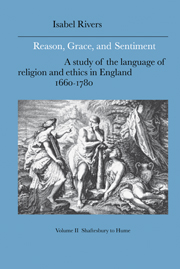Book contents
- Frontmatter
- Contents
- Preface
- Abbreviations
- Introduction
- 1 The true religion of nature: the freethinkers and their opponents
- 2 Shaftesbury and the defence of natural affection
- 3 Defining the moral faculty: Hutcheson, Butler, and Price
- 4 The ethics of sentiment and the religious hypothesis: Hume and his critics
- 5 The conflict of languages in the later eighteenth century
- Bibliography
- Index
3 - Defining the moral faculty: Hutcheson, Butler, and Price
Published online by Cambridge University Press: 15 December 2009
- Frontmatter
- Contents
- Preface
- Abbreviations
- Introduction
- 1 The true religion of nature: the freethinkers and their opponents
- 2 Shaftesbury and the defence of natural affection
- 3 Defining the moral faculty: Hutcheson, Butler, and Price
- 4 The ethics of sentiment and the religious hypothesis: Hume and his critics
- 5 The conflict of languages in the later eighteenth century
- Bibliography
- Index
Summary
Now all men of reflection, from the age of Socrates to that of Addison, have sufficiently proved that the truest, most constant, and lively pleasure, the happiest enjoyment of life, consists in kind affections to our fellow-creatures, gratitude and love to the deity, submission to his will, and trust in his providence, with a course of suitable actions.
Hutcheson, Remarks upon The Fable of the Bees (1726)It is manifest great part of common language, and of common behaviour over the world, is formed upon supposition of … a moral faculty; whether called conscience, moral reason, moral sense, or Divine reason; whether considered as a sentiment of the understanding, or as a perception of the heart; or, which seems the truth, as including both.
Butler, Dissertation II, ‘Of the Nature of Virtue’ (1736)the soul of man, not only bears a resemblance of the Divine Intelligence in its rational faculties, but also of the Divine disinterested benignity in its social and public affections: and thus too our int ed. Bernardernal constitution, formed for pursuing the general good, beautifully tallies with the constitution of the universe.
Leechman, Preface to Hutcheson, System of Moral Philosophy (1755), I, xixVIRTUE is of intrinsick value and good desert, and of indispensible obligation; not the creature of will, but necessary and immutable; not local or temporary, but of equal extent and antiquity with the DIVINE MIND; not a mode of SENSATION, but everlasting TRUTH; not dependent on power, but the guide of all power.
Price, Review of the Principal Questions in Morals (3rd edn, 1787)- Type
- Chapter
- Information
- Reason, Grace, and SentimentA Study of the Language of Religion and Ethics in England, 1660–1780, pp. 153 - 237Publisher: Cambridge University PressPrint publication year: 2000



